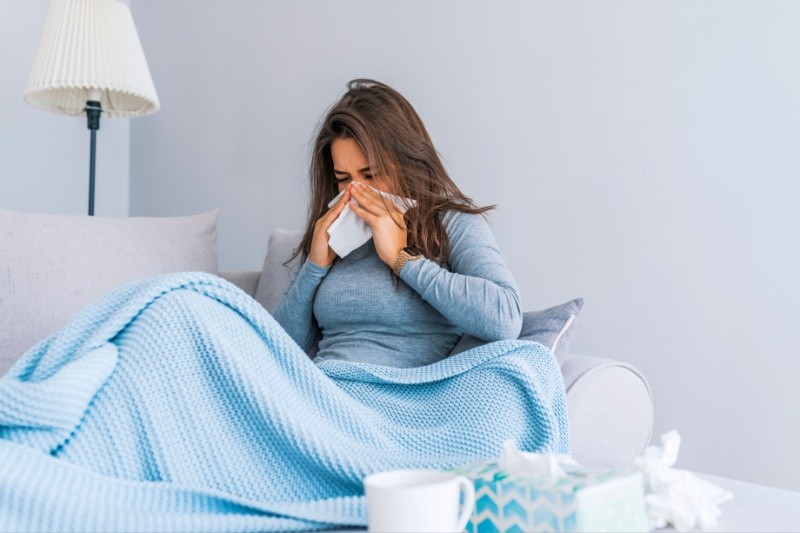Ever wondered why you keep coughing mostly throughout the rainy season? You cough to release air or clear any irritation in the throat. However, a chronic cough is a persistent cough that lasts for at least eight weeks or often much longer.
What you need to know:
- Why monsoons worsen chronic coughs?
- Chronic cough vs. monsoon cough: The difference
- Relief strategies from chronic cough during monsoon
- Long-term cough management: Tips for maintaining respiratory health
Why monsoons worsen chronic coughs?
Rainy, cold weather can trigger sneezing, nasal congestion, and cough. During the monsoon season, there is an increase in cases of cough due to various factors such as –
- Air pollution – There are high levels of air pollutants like nitrogen dioxide and sulphur dioxide in the monsoon season;
- Changes in air quality – Monsoon season oxidizes contaminants but also redistributes pollutants globally; and
- Prevalence of respiratory disease – If you are already affected by a respiratory disease, the monsoons can worsen your condition.
Increased humidity and irritated airways
High levels of humidity during monsoons can trigger allergic reactions and worsen cough. Mould spores when inhaled can irritate the respiratory tract leading to sneezing, coughing and congestion.
Exposure to allergens
The dampness during the monsoon can cause mould and dust mites to thrive. When mould spores are inhaled, they cause coughing. Similarly, dust mites can trigger allergies and worsen coughing.
Weakened immune system
The sudden temperature changes and dampness can weaken your immune system during the rainy season, making you susceptible to infections such as colds, flu and cough.
Chronic cough vs. monsoon cough: The difference

Do you have a stubborn cough that doesn’t seem to go away? It may be a chronic cough, which gets worse in winters. It is a persistent cough that lasts for at least eight weeks and often much longer.
You have a monsoon cough if your respiratory tract gets swollen. It is caused by environmental changes in the monsoon season and can remain for a short time and reoccur. The symptoms include –
- Frequent dry cough
- Chest discomfort
- Wheezing
- Shortness of breath
- Low-grade fever or no fever
- Body aches
- Runny, stuffy nose
- A sore throat
Relief strategies from chronic cough during monsoon
Given below are a few relief strategies for chronic cough during monsoon –
Air purification
Using an air purifier can –
- Help lower indoor air pollution from airborne pollutants that can cause significant irritation to your respiratory health, and
- Eliminate airborne allergens and toxins that lead to coughing spells and airway irritation.
Hydration
You must drink plenty of warm fluids like herbal teas, soups, and warm water with honey to –
- soothe your irritated throat
- thin the mucus, and
- keep your respiratory passages moist, reducing coughing fits.
Using a humidifier to moisten dry air
Dry air can dry out your throat, making you more prone to coughing fits. A humidifier adds moisture to the air, helping to release the mucus in your chest and reduce coughing.
Long-term cough management: Tips for maintaining respiratory health

Following are a few tips for maintaining respiratory health for long-term cough management –
- Smoking narrows air passages and makes breathing difficult. It causes swelling in the lungs. So, you must avoid it at all costs.
- Improve your indoor air quality and keep yourself at bay from outdoor air pollution.
- Avoid exercising outdoors when the air quality is poor.
- Avoid exercising near high-traffic areas.
- Don’t burn wood or trash.
- Prevention is better than cure. Get regular check-ups to rule out any respiratory issues.
- Exercising regularly will manage your overall fitness and keep ailments at bay.
- Eating an antioxidant-rich diet, including veggies like broccoli, carrots, spinach, potatoes, cabbage, radish and pumpkin, helps prevent and recover from chronic diseases and helps improve your lung health.
- Cover your nose and mouth while you cough. Wash your hands often and maintain good personal hygiene.
Keep sneezing at bay and beat the monsoon season woes! Protect yourself from cold and cough by taking simple but effective measures. Enjoy a safe and healthy monsoon.
Stay tuned to the Activ Living Community. Keep up to date with the latest health tips and trends through expert videos, podcasts, articles, and much more on nutrition, fitness, mindfulness, and lifestyle conditions like Asthma, Blood Pressure, Cholesterol, and Diabetes. Activ Living ke saath sahi sehat ki shuruaat ABHIkaro.
You may also be interested in the following blogs:
- Monsoon Health Tips For Kids: Stay Healthy And Safe In The Rainy Season
- 4 Foods to Avoid During Monsoon to Keep Your Health Fit
Popular Searches
How to lower blood pressure | Fruits good for liver | Unhealthy foods | Ragi Benefits | Basal Metabolic Rate | Acupressure points for High Blood Pressure | Ayurvedic medicine for blood pressure | How to control cholesterol at home | Homeopathy for Asthma | Biological Age | Home remedies for TB | Natural beta blockers | Negative effects of internet | Types of walking | Blood pressure calculator | Blood sugar calculator | BMI Calculator





 1800-270-7000
1800-270-7000






